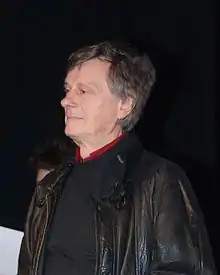Boro Drašković
Boro Drašković (Serbian Cyrillic: Боро Драшковић; born 29 May 1935) is a Serbian director, playwright and screenwriter.
Boro Drašković | |
|---|---|
 Drašković in 2011 | |
| Native name | Боро Драшковић |
| Born | 29 May 1935 Sarajevo, Kingdom of Yugoslavia |
| Occupation | Director, playwright, screenwriter |
| Nationality | Serbian |
Biography
Boro Drašković graduated from Belgrade's Academy of Theater, Film, Radio, and Television in 1959. Drašković entered the film industry as an assistant to Polish director Andrzej Wajda in 1962. Four years later, he assisted Jerzy Kawalerowicz. Drašković sold his first screenplay in 1964. In 1969, he made his first fictional feature film, Horoscope, and subsequently made three more features, all of which he co-scripted.[1] In addition, Drašković has made documentaries and worked on television and radio; he has also written several books on cinema and theater. In theater, he explained the most important works in a wide arc from Aeschylus to Beckett, along with Shakespeare, Molière, Chekhov, and Serbia's own classic Domanović, Petar Kočić, Danilo Kiš. He has directed several TV movies and TV documentaries: Tobacco Road, Kitchen, Belgrade Children, Maria and Interview with Laxness. He is the author of several books on acting and directing: Change, Labyrinth, Mirror, The Paradox of the Director and The Monkey King.[2]
He received a doctorate honoris causa from the École supérieure de réalisation audiovisuelle.[3]
Works
Draskovic's movies, plays and books, have been awarded many times in his own country and abroad. Among others, he won the awards of the cities of Belgrade, Sarajevo, Mostar and Novi Sad; the Grand Prix of the City of Orléans; Unicrit Berlin; the Award of the movie spectators, Moscow; Special award for directing, the Great Silver Arena, Pula; the Gold Hugo (for screenplay), the Silver Hugo (for the movie), Chicago; the Award for the screenplay, the Yugoslav screenplay festival, Vrnjacka Banja; Steria's Prize for theatrology; the Award by audience: St. Lewis, Valencia, São Paulo, Sopot; Grand award, World Fest, Charleston; the Silver Dolphin, Troy; the Award for the exceptional directing "Saint Ardalion"; Joakim's Award for the best directing; Best of Fest award, Minneapolis; „Schermi d'Amore" for the best artistic contribution, Verona; the Award or TEA for exclusive director's poetics; the Mediterranean film festival award for peace and tolerance, Jerusalem. He was rewarded the Charter of the National Theatre for exceptional merits and contribution to the history of the National Theater, as the sign of appreciation and gratitude. For the movie Life is Beautiful he was presented the Gold Gladiator, the Grand Prix of Yugoslav Film Academy for the biggest esthetical achievement in the film art. Draskovic won the Plaque of the Yugoslav film library for the exceptional contribution to the Serbian movie, the University award for the lifetime achievement, the awards of the Serbian film artists association for entire artistic creation and contribution to the Serbian cinematography and the Statuette of Joakim Vujic for the exceptional contribution to the development of art of theater in Serbia.
Filmography
- Horoscope, 1969
- Knockout, 1972
- Heat, 1979
- Life Is Beautiful, 1985
- Vukovar, jedna priča, 1994[4]
TV documentaries, series and movies
- Tobacco Road, TV mini series, 1981.
- Kitchen, TV movie, 1976.
- Belgrade Children, TV movie, 1976.
- Maria, TV movie, 1976.
- Arandjel Accident, TV movie, 1976.
- Praise Iceland, TV documentary, 1973.
- Interview with President of Iceland, TV documentary, 1973.
- Weekly afternoon in Greenland, TV documentary, 1973.
- Interview with Laxness, TV documentary, 1973.
- The Paradox of Chess, TV documentary, 1973.[5]
Books
- Change
- Mirror
- Labyrinth
- The Paradox of the Director
- Monkey King, Prometheus – Novi Sad, 1996.
- A View of Passers, Prometheus – Novi Sad, 2006, ISBN 86-515-0019-X
- Balance, Literary Municipalities Vršac, 2007, ISBN 978-86-7497-128-4
- Drama of Director
- A Film about Film, Prometheus – Novi Sad, 2010, ISBN 978-86-515-0551-8
- Olive Circle, Novi Sad, Theater Museum of Vojvodina, 2011, ISBN 978-86-85123-55-9[6]
- Dictionary of the Profession, Knjaževsko-srpski teatar, Kragujevac, 2012, ISBN 978-86-909821-7-2 [7]
See also
References
- Boro Draskovic Movies
- Boro Drašković
- Pronounced Doctor Honoris Causa at University of audiovisual arts ESRA Archived July 25, 2013, at the Wayback Machine
- Boro Draskovic Filmography
- IMDb, Boro Draskovic Filmography
- "JoakimInterFest 2011, Olive circle - Book promotion". Archived from the original on 2010-02-13. Retrieved 2011-10-28.
- "DESCENDANTS OF JOAKIM, www.joakimvujic.com". Archived from the original on 2009-04-15. Retrieved 2013-02-10.
External links
| Wikimedia Commons has media related to Boro Drašković. |
